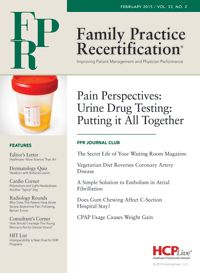Publication
Article
Family Practice Recertification
Do Statins Alter or Impair Cognitive Ability; A Systematic Review and Meta Analysis
Author(s):
In 2012 the FDA issued a warning about the potential for statins to induce adverse effects on cognition; this systematic review and meta analysis of randomized controlled trials was completed to determine if this was true.

Frank J. Domino, MD
Review
Journal Gen Intern Med.
DOI: 10.1007/s11606-014-3115-3 January 2015.]
Methods
Standard systematic review protocols were employed evaluating the literature through December 2012 to determine if randomized controlled trials of statin treatment vs. placebo or standard of care included at least one cognitive outcome and the frequency of adverse cognitive events or measurements using standard neuropsychological testing.
Results & Outcomes:
Twenty-five randomized controlled trials vs. placebo reported cognitive outcomes in 46,836 patients. The research showed that 23 of these trials reported cognitive test results in 29,012 participants. Adverse cognitive outcomes attributable to statins were rarely reported in trials involving cognitively normal or impaired subjects.
Meta analysis of cognitive test data on 14 studies covering more than 27,000 participants failed to show significant adverse effects of statins on all tests of cognition in either normal subjects (standardized mean difference = 0.01 (95% CI: = 0.01-0.03, p = 0.42)) or those with Alzheimer’s Disease (standardized mean difference = -0.05, 95% CI = -0.19-0.10; p = 0.38).
Conclusion:
Statin therapy was not associated with cognitive impairment in randomized controlled trials that included adverse cognitive events or a change in neurocognitive testing.
Commentary:
The adverse effects of statins commonly include myalgias and abdominal pain. Long-term complications have been shown to include an increased risk for diabetes. Life- threantening adverse reactions are uncommon and include chemical hepatitis, myopathy, rhabdomyolysis, and secondary acute renal failure.
Based upon post-marketing reports, the FDA released a warning about the potential for HMG CoA Reductase Inhibitors (statins) to alter cognitive function. This systematic review and meta analysis attempted to determine if this warning was justified.
Its outcomes demonstrate that when looking at a large number of patients with extended follow-up in studies that employed neurocognitive testing, no changes were found. This is reassuring as these agents continue to be used more commonly for primary prevention based upon current American Heart Association guidelines.
Strengths of the study are its broad scope and large number of participants involved in the data collection. Its main limitation is that its conclusions were drawn from studies that looked primarily at performance on cognitive testing. looked for studies that reported adverse cognitive events or neurocognitive testing.
It is possible that some studies that had adverse cognitive outcomes did not include those outcomes in their publications leading to under reporting of adverse events. This risk for bias is particularly great in industry-sponsored trials. Nonetheless it is reassuring that the risk for adverse outcomes from severe muscle or liver damage are rare, and that statins are unlikely to be causative with regard to cognitive dysfunction in normal adults as well as those with Alzheimer’s Disease.
